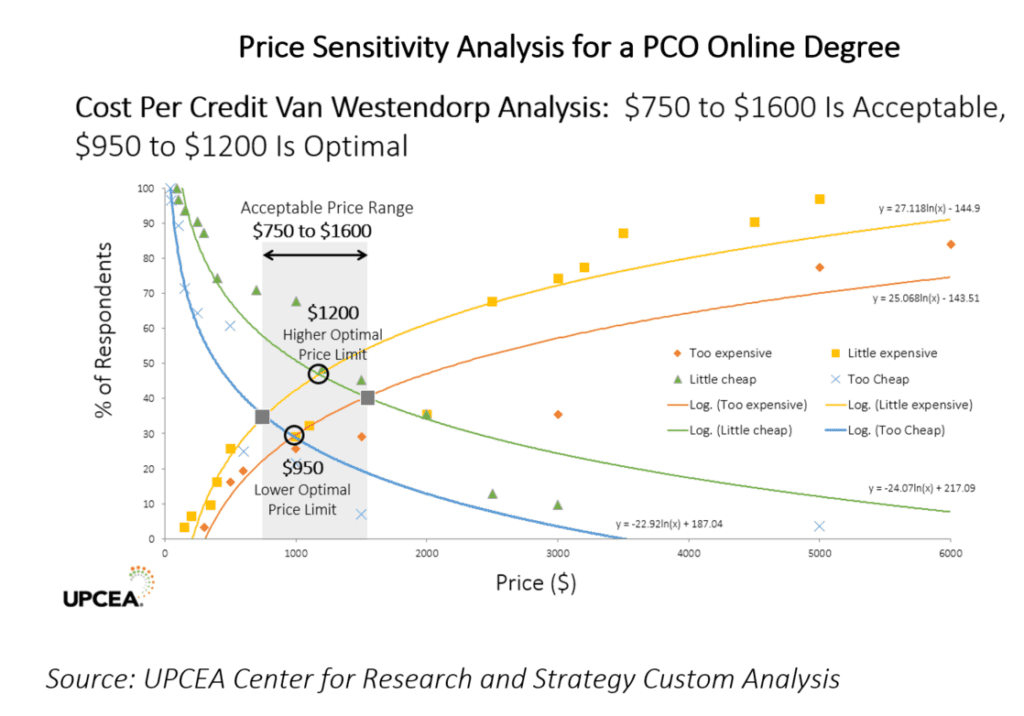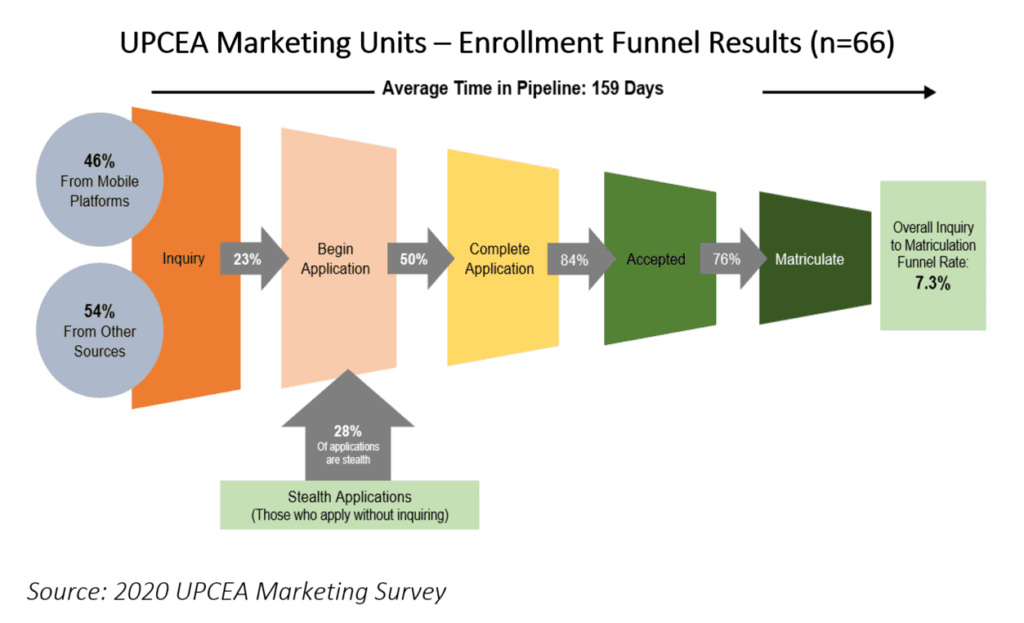Marketing and Enrollment Management in a Time of Uncertainty
Institutions of higher education are faced with major challenges and have leaned toward many of their professional, continuing and online (PCO) education units to not only assist with bringing traditional teaching faculty into a more aggressive world of online learning, but to also supplement lost revenue and enrollments due to students not returning to campus or choosing to sit out a semester or year. PCO units have traditionally been tasked with helping adults complete their degree; develop online or low residency master’s degrees online for working professionals; launch and deliver training to executives, managers and front-line workers in the form of noncredit or certificate programs; and serve special audiences such as dual-degree K-12 students, academic youth campers and retirees among others. With the pandemic, PCO units have been asked to do more and are often better positioned to react in this marketplace. However, many are faced with dire financial situations and have to make difficult choices. Cutting marketing and enrollment management should not be one of them, as these units are critical in the generation of revenues in a chaotic market.
PCO units are even more critical to the institution, as due to the pandemic they have been asked to generate additional revenues from existing audiences, serve as a safety net or option for traditional students, and develop new programs and services to reach new audiences. PCO marketers and enrollment managers will be critical in the process and will need to accomplish the following as institutions work through the pandemic and post-pandemic era:
- Comfort existing students by communicating that their current investments in the degree or certificate programs they are in are sound and have value in the new economy, post-pandemic. Retention is more critical than ever. Marketers and enrollment managers need to reassure students who may be midstream in an online master’s degree that the return on investment to keep moving forward toward completion outweighs abandoning their investment as a sunk cost. Ignoring existing students would be yet another leaky revenue bucket, in addition to potentially losing traditional students.
- Help the PCO unit, as well as the institution, with adapting their use of marketing tools and media choices, as well as messaging given the pandemic and sensitive social issues. Marketing in a pandemic may require new messaging and creative approaches, as well as shifting to new media to generate new inquiries. Messaging during a crisis requires that communications be more compassionate, authentic and appear to NOT be taking advantage of the consumer who might be in a disadvantageous situation.

- Represent the voice of the customer on value and pricing decisions. As a result of values and financial situations changing, PCO leaders no longer have strong intuitions or reliable historical data on value and pricing. UPCEA has been working with a number of members on re-pricing of programs, especially for those delivered in a new format. Gathering information from consumers and students on how much they might pay for a virtual format over a face-to-face format program is critical in setting value-driven pricing and optimizing gross or net revenues. Market research tools such as the use of surveys or techniques such as the Van Westendorp Price Sensitivity Meter could help units with pricing decisions. The figure to the left demonstrates how UPCEA helped one group on pricing. This shows that, depending on whether or not the programmatic strategy is to generate more enrollments at a lower per credit price point or more net revenue (or profit) at a higher price point, there are options to choosing the most appropriate price point.
- Marketers may have to create new strategic marketing plans or interim, short-term plans as a result of the pandemic. For those with strong customer relationship management (CRM) systems, being able to track return on investment (ROI) of new or supplemental marketing spending could be a strong measure of the success of short-term marketing initiatives. Every marketing dollar spent to generate new revenues is likely to be scrutinized. Positive ROIs may show the PCO unit and institution the path to survival or success. Otherwise, marketers may be spending marketing investment monies blindly…not knowing a net positive return.
“Message and tone coalescence has never been more important. Lead generation advertising still has to meet the need of the viewer to drive action and with the current consumer uncertainty, we are finding ourselves confirming those same messages all the way through the funnel.”
-Stacy Snow, Director of Marketing & Communications, University of Missouri System Office of eLearning
In addition to top of the enrollment funnel activities, PCO marketers and enrollment managers need to revisit the customer experience with mid- and end-funnel activities.

While retention is critical, how inquirers and prospects are engaged and treated in the process is more important than ever. With consumers and employers having less training and education funds, the expectations will be higher. Should PCO units fail to communicate correctly, the new lead will most likely shop elsewhere. PCO marketers and enrollment managers will need to self-examine their steps to matriculation. The figure to the right charts enrollment funnel progression in an UPCEA study of 66 marketing departments. Units will need to map out processes to ensure that every action or scenario is addressed to maximize inquiry to matriculation rates.
In these uncertain times, given the pandemic and societal disruption and change, the challenges to higher education are magnified as the old economy is changing and moving to one of greater automation and technology. Generational power is shifting from Boomers to Millennials. Generation Z’s greatest new digital video fad (whether it becomes a trend or not) is TikToK, which also offers advertising opportunities through the use of influencer marketing. Under-represented ethnic and income groups are seeking equality. Communicating and marketing and the exchange of money has become increasingly more complex. Smart, resourceful, data-driven marketers and enrollment managers will be more important as society works through the pandemic and the new economy that will follow.
Learn more about UPCEA's expert consultants.
Do you need help with your PCO unit or campus? We can help. Contact UPCEA Research and Consulting for a brief consult. Email [email protected] or call us at 202-659-3130.
Trusted by the nation's top colleges and universities, UPCEA Research and Consulting provides the best value in the industry today. UPCEA's industry experts have years of experience in Online and Professional Continuing education - put them to work for you!
UPCEA Research and Consulting offers a variety of custom research and consulting options through an outcomes-focused pricing model. Find the option(s) that best suit your institution.
Learn more about UPCEA Research & Consulting
The UPCEA Difference
Unmatched Experience: For more than 100 years, UPCEA consultants have exclusively served the needs of online and professional continuing education programs. UPCEA consultants leverage their extensive industry expertise to expedite solutions, anticipate upcoming shifts, and offer distinct best practices, effectively aiding clients in achieving their goals.
Cost Effectiveness: As a nonprofit, member-serving organization, we provide unmatched value, allowing you to maximize limited research and consulting budgets.
Action in Motion: Our cadre of experienced, skilled authorities and expert practitioners propels you forward, translating research and consulting into impactful implementation, a distinctive hallmark of UPCEA. Our team of current and former institutional leaders will support you, turning research and consulting into action.
Mission Alignment: Like you, our mission is to enhance and expand educational opportunities and outcomes for adult and other non-traditional learners. We share your values and work in partnership with you to advance access and excellence in education.
